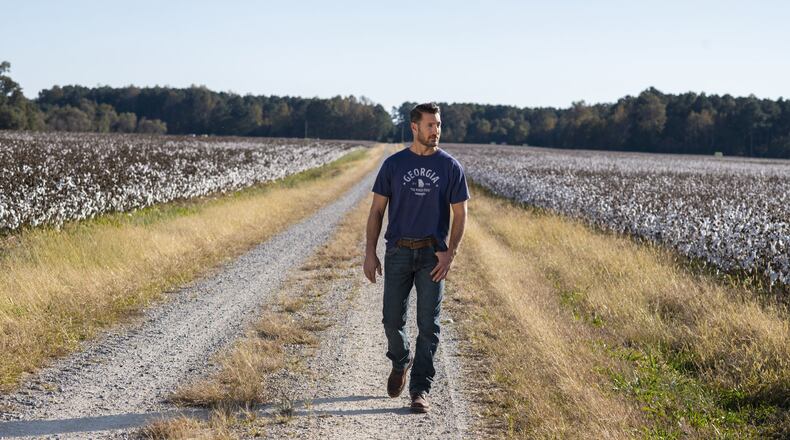Adam McLendon remembers the day he left the family farm and went off to college. He was 18 and he just knew he was leaving for good. “I’m gone, you guys will never see me again,” he said, waving to everyone who worked on the farm his entire life.
But while he was off studying plant biology, he couldn’t resist the pull of the land. After graduating from Georgia Southern University in 2006, McLendon, now 36, headed home and began working with his father at McLendon Acres in Leary.
For more than a decade, the 8,800-acre family-owned commercial farm about three hours south of Atlanta has been recognized for its commitment to conservation and innovation. Now the farm is making its mark in fashion.
McLendon Acres is one of five cotton growers in the country to partner with North Carolina-based Wrangler on the Wrangler Rooted Collection — a locally sourced line of denim designed to honor land stewardship and bring a little more pride to cotton-producing states. The program, just one example of the growing farm-to-fashion trend, offers 100% sustainable cotton jeans and T-shirts to consumers who desire a traceable connection to the clothing they buy. The partnership also highlights the shifting focus in industries not always recognized for sustainability.
“There has been a quiet revolution on farms where growers are evaluating their practices and improving their footprint and become good land stewards. The effects are pretty profound,” said Roian Atwood, senior director of sustainability for Wrangler.
RELATED: Women, beginning farmers emerge in U.S., state agriculture
In addition to promoting the brand’s commitment to sustainability, the company wanted to help consumers make a more direct connection to the clothing they wear. “We wanted to go with the idea that you can pick up this pair of jeans and know exactly what farm it came from,” Atwood said.
The Georgia jean uses cotton from McLendon Acres with denim fabric made by Mount Vernon Mills in Trion. The jeans, cut and sewn in El Paso, Texas, are 100% American made. Designed for men, the $100 jeans feature details including the state silhouette on the label, button closure and pocket. Two T-shirts with Georgia designs are priced at $30 and feature cotton sourced in Texas. All of the T-shirts in the collection are manufactured in the Carolinas. Farms in Alabama, North Carolina and Tennessee are also partners in the collection, which is available online at Wrangler.com and participating retailers.
If farming and fashion seem to be an odd pairing, the industries share a reputation for taking a toll on the environment. Atwood and McLendon said there is a growing need for innovation and transparency in both industries to change those perceptions.
“I think farmers can be misunderstood as people who don’t take good care of the land … and nothing could be further from the truth. Caring for the land is how we make our living year in and year out,” said McLendon. Over the years, the family has invested in a number of innovative practices. Soil health practices on the farm led to the partnership with Wrangler.
McLendon Acres, which also has corn and peanut crops, uses practices that build healthy soil, including cover crops or unharvested crops that are used solely to enhance soil, crop rotation to reduce the need for pesticides, and conservation tillage in which only a narrow strip of land is tilled for planting to prevent problems such as soil erosion that would result from plowing. Wrangler plans to source 100% of its cotton from farms using soil health practices by 2025, Atwood said.
Georgia produces about 18% of cotton in the U.S., second only to Texas. Last year, local farmers struggled against hurricanes and rain, which resulted in millions of dollars in losses, and cotton acreage is expected to decline by 3.6% this year, according to the National Cotton Council’s 38th Annual Early Season Planting Intentions Survey.
RELATED: Heat wave has Georgians cautious about crops, outdoor activities
In the past five years, many growers have turned to fashion and retail to promote their cotton and in some cases, generate additional revenue for their farms. Georgia-based Southern Drawl uses cotton from several Georgia farms in bed linens, tea towels and other products all with their “Field to Fabric” label indicating the product is American made.
Monty Bain, Southeastern regional communication manager for the Cotton Board, which oversees research and marketing for U.S. upland cotton, has connected more than a half-dozen growers in the Southeast with experts at Cotton Incorporated, worldwide leaders in cotton research and promotion. Cotton Incorporated offered guidance on how cotton farmers can turn their own crops into product lines ranging from polo shirts to luxury linen. Bain said growers are increasingly taking their cotton directly to consumers as finished products.
McLendon said that kind of transparency is what appealed to him about working with Wrangler. “It is important to me and the main reason we are excited to get involved is to have the outreach and connectivity to customers. I think it is a great opportunity to get people more in tune with what is going on on a real farm,” McLendon said.
It is also an opportunity for farmers to better understand consumers and their concerns, McLendon said. “I am a fan of everybody being as involved in agriculture as much as they possibly can,” he said.
About the Author
The Latest
Featured



